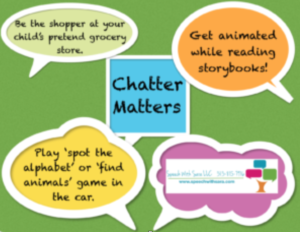 There are ways to help your child develop speech and language skills way before they are actually talking to you. Children learn through their every day environment–that means from their interactions with you, extended relatives, siblings, babysitters and other caregivers. They learn through play with people and toys. Babies start learning the turn-taking nature of conversation when someone responds to their cries, their coos and babbles and even during a good game of peekaboo with a blanket or hands.
There are ways to help your child develop speech and language skills way before they are actually talking to you. Children learn through their every day environment–that means from their interactions with you, extended relatives, siblings, babysitters and other caregivers. They learn through play with people and toys. Babies start learning the turn-taking nature of conversation when someone responds to their cries, their coos and babbles and even during a good game of peekaboo with a blanket or hands.
Some of the ideas below may sound obvious, but in today’s busy family climate, sometimes the basics of communication fall to the wayside in the hustle and bustle of every day life.
Talk to your child every day. Talk about what you’re doing, about what your child is doing, about your location, places and things you see during travel or while shopping. Treat babbling from a baby as communication and respond to it.
Engage in conversation with your child. When they ask a question, offer expanded information about the topic. Repeat their phrases and add more to it. This is a strategy of expansion and extension in which children learn the structure of language as well as context and vocabulary.
Model strong non-verbal communication skills, such as eye-contact, turn-taking in conversation/games, facial expressions and intonation. This helps children learn how to interpret and react to the non-verbal elements of communication, such as body language.
Read to your child every day. Establish a routine early and stick to it. Of course there will be days when this is not an option but make those the exception rather than the norm. Reading aloud exposes children to a variety of vocabulary. It helps children build & improve their joint attention skills, learning/understanding of language and helps with speech-sound development.
Picture books provide a context and tangible reference for children to the language that is being shared in the story for younger children. Continue to read aloud to children after they’ve started reading on their own. This enhances their vocabulary, their understanding of the characters, the story elements, their own reading fluency, their understanding of humor and idioms, and more.
During reading, take time to stop and talk about different parts of the book or to explain a new vocabulary word. In explaining new words, relate it to something familiar for your child. Provide them the definition as well as an example. Providing both leads to better comprehension of the concept.
Visit and explore different places—inside and out. Go the local library and check out books (or read some there). Go grocery shopping together. Have a picnic at the park. Take a walk in your neighborhood when it’s raining or snowing. Visit the zoo. Paint outside. These are great opportunities in which conversation happens naturally and robustly.
Play board, card and other low-tech games. There is a lot of quality communication that happens during traditional game-playing, which helps children learn pragmatic (social communication) skills. It also teaches skills such as turn-taking, how to be a graceful winner/loser, as well as improving executive function skills such as organization, strategy and memory.
Engage in pretend play. Be the shopper at your child’s grocery store; the customer at their restaurant; or the sick patient in their doctor’s office. This provides children with a great opportunity to practice their speech and language skills and to hear a great model of appropriate speech and language from you. It also allows concepts with which children are already familiar to be expanded upon, building their semantic network. They also learn reciprocal communication skills.
Make a variety of toys and books available. Open-ended toys (those that don’t come to a clear end) are great for generating conversation. Examples include: blocks, play kitchen, a toy farm/house, cars, dolls, etc. Close-ended toys, such as puzzles, are also good but more limiting to the amount of spontaneous conversation that can happen during play.
Have questions about your child’s speech and language development, contact Speech With Sara LLC, 313-815-7916 or email: sara@speechwithsara.com.
